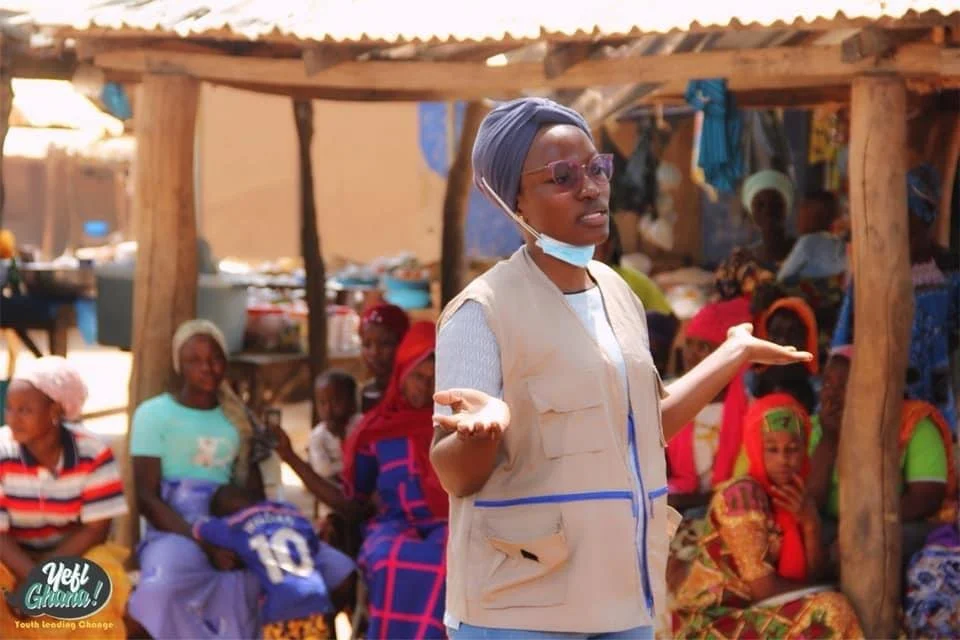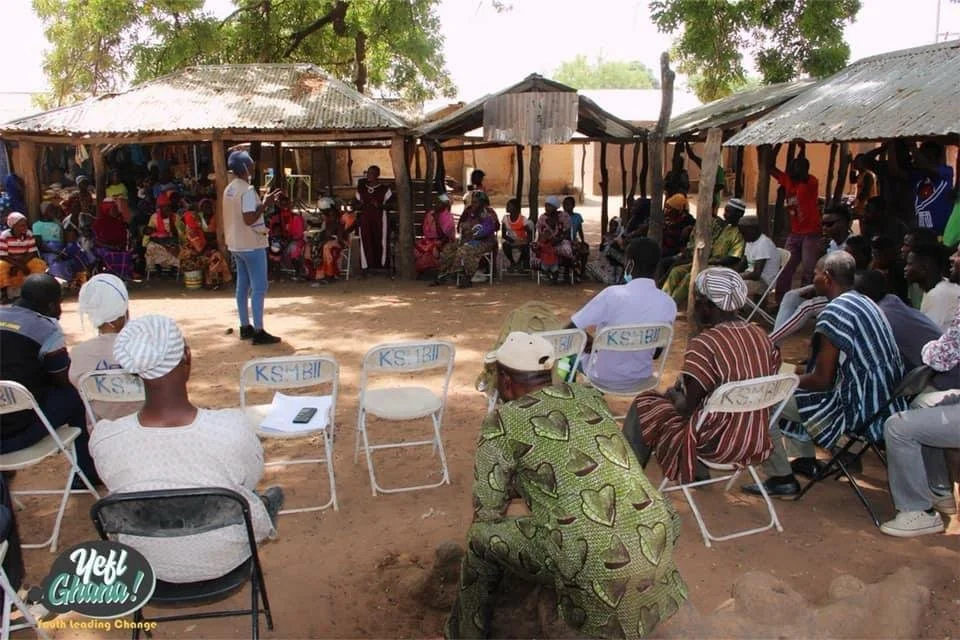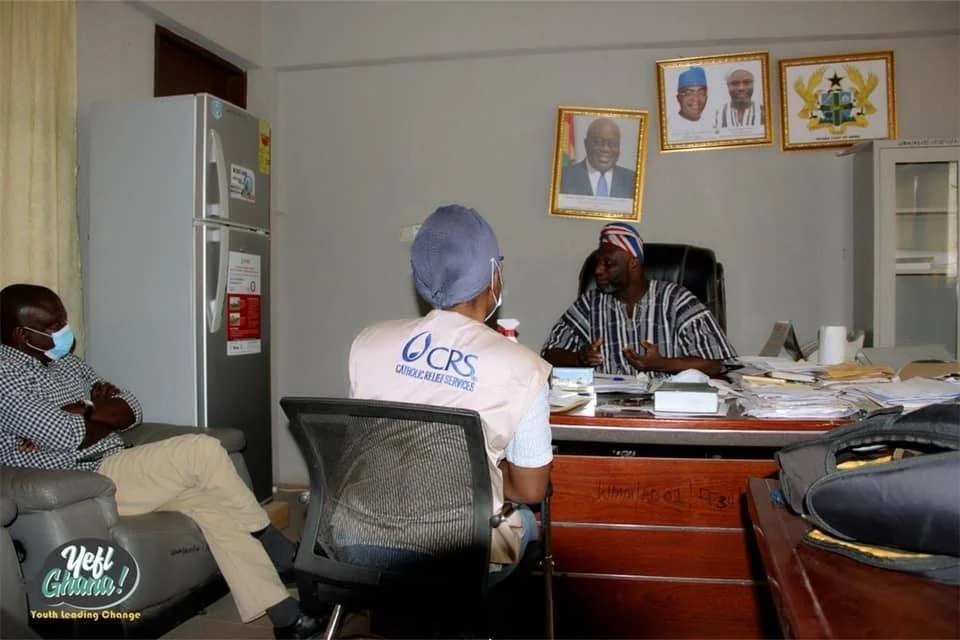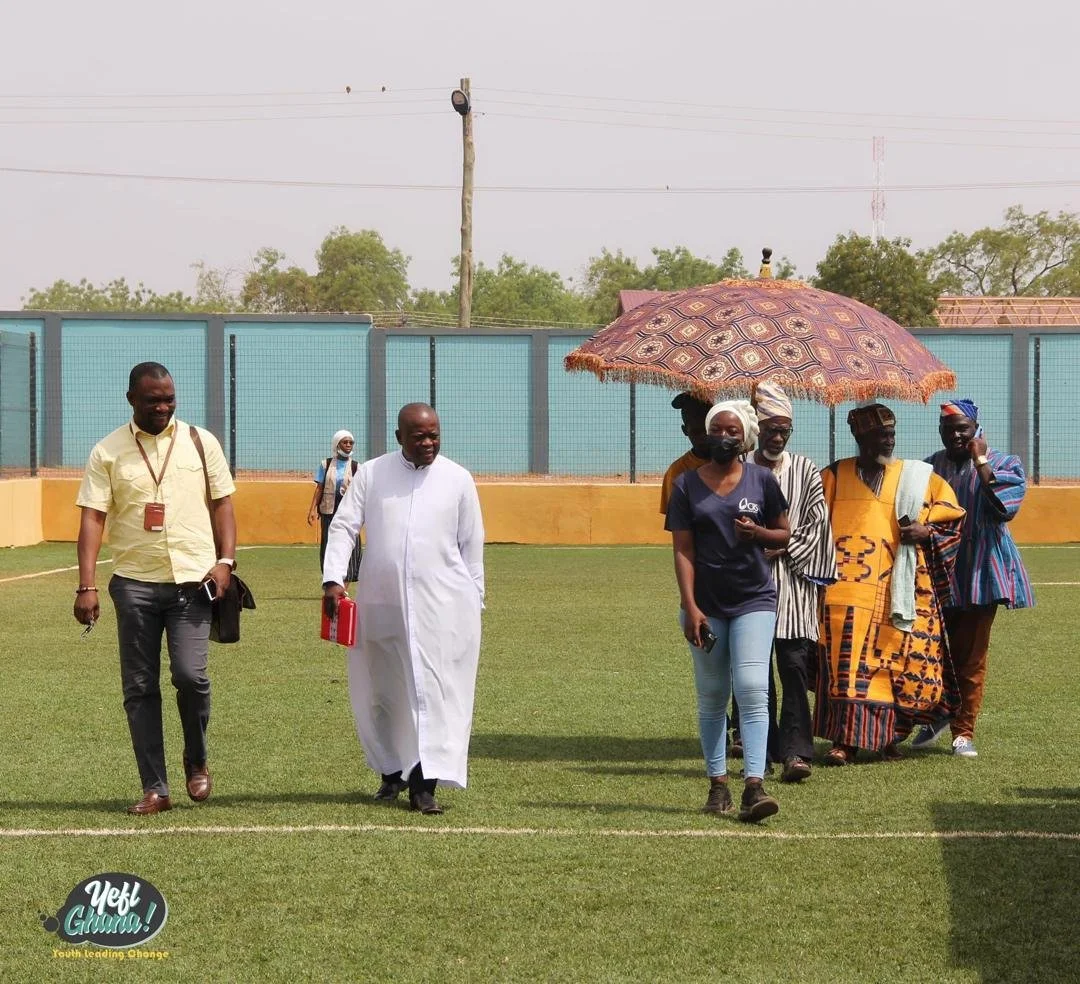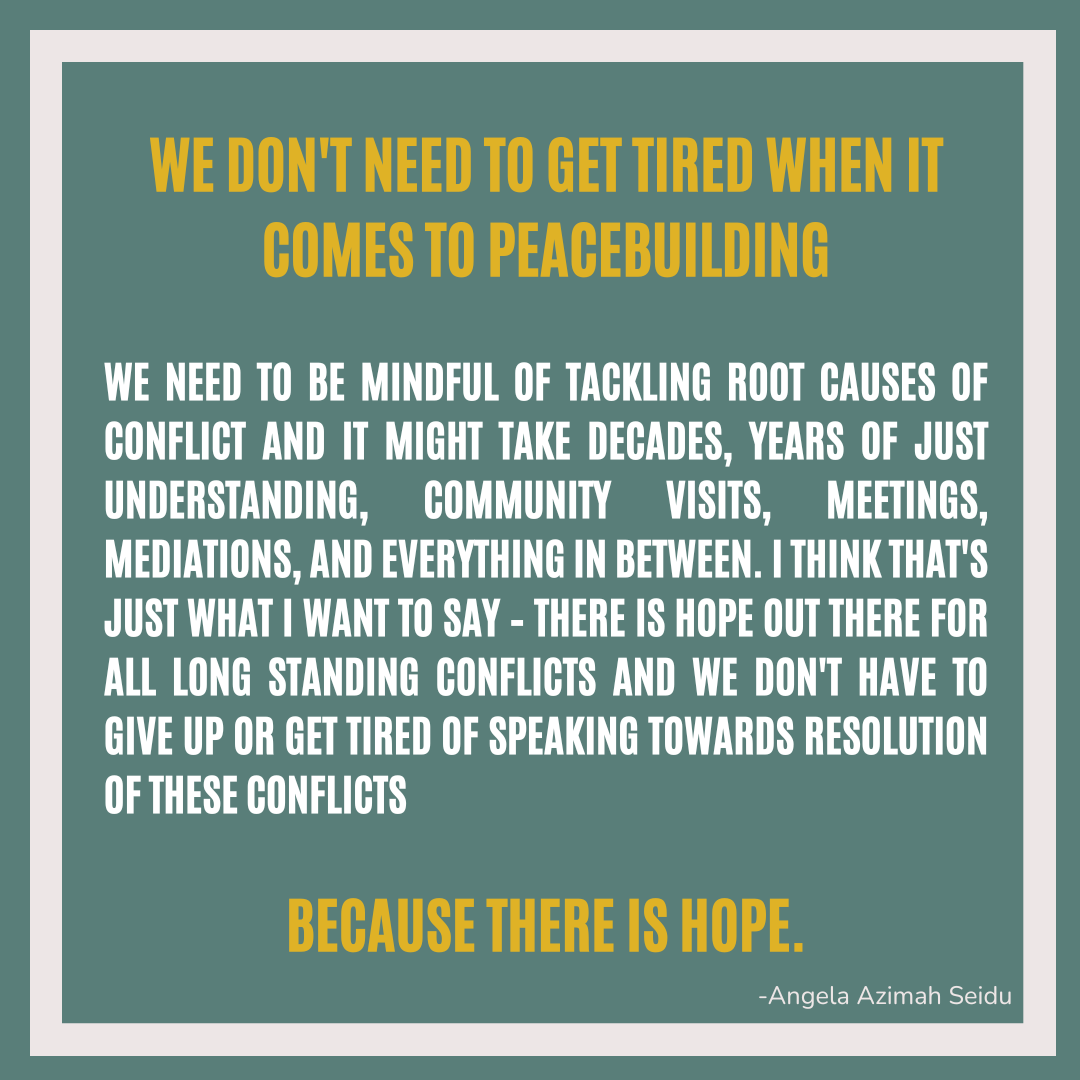At the Nexus of Peace and Development: A Beam of Hope
With experience in community mobilization, youth engagement, youth-led employment, migration programs, dialogue facilitation, participatory research, and community reconciliation, Angela Azimah Seidu exemplifies intersectional peacebuilding. Her interest in and eye for bridging development, peacebuilding, and humanitarian work is driven by her early exposure to interethnic disputes and gender-based biases as a young woman in Northern Ghana, and a calling to use her lived experiences to support others. Dreaming of a world where conflict-affected individuals recover from trauma, structural violence is eradicated, and root causes of conflict are truly addressed, Angela uses her voice as an advocate for inclusion in decision-making spaces, as a champion of uplifting lived experiences and those most marginalized in conflict, and as a collaborator with communities to contextualize solutions.
We interviewed Angela to learn more about her passion for peacebuilding, to hear her standout lessons learned from her vast project experiences, and to elevate her practical recommendations for the field moving forward. While the state of peacebuilding can feel chaotic, and the intersections and needs can feel overwhelming, Angela encourages us to not give up, reminds us of the importance of staying the course, and the opportunity of hope.
[The full interview has been edited for length and readability].
How did peacebuilding become your passion? Where does that stem from?
For my bachelors degree, I studied Family and Consumer Sciences with a specialization in food and nutrition, which is way different from the field I'm currently in. In my final year of undergrad, I realized I had a lot of flare and passion for nonprofit organizations. Even though I could help people with my nutrition background, through nutrition education to help malnourished children and all of that, I thought there was more sense and substance going into communities and helping people dealing with conflicts, mental health and psychosocial support, and other development issues.
That stemmed from the fact that growing up I witnessed a lot of interethnic conflicts in northern Ghana, and most times you find women and children being the most impacted by these conflicts. Yet they are usually sidelined when it comes to decision making. Or you’ll find NGOs and other organizations coming in to support communities and they are focused on the chiefs, they are focused on the community elite, mostly males, rather than focusing on the groups that are the most affected. So just looking at how peacebuilding and other developmental interventions can either support or do more harm to the women and girls and children who are most impacted by these conflicts, but who are often overlooked in peacebuilding phases, ignited my passion in the field, to at least do my best in the little ways I can to ensure that their voices and opinions are part of the decisions these organizations and community leaders make.
What has your work as a peace leader looked like? What examples and lessons stand out to you?
The very first project I worked on at Catholic Relief Services in Ghana was an endline evaluation of the promoting peace in northern Ghana project. This project was geared towards Ghana’s 2016 general elections. We worked with young people who are usually being used as weapons for electoral violence, and at the end of the day we tasked them to come up with a list of activities that they would want to implement in their communities, also considering women and children in those communities. Shifting the focus from us planning the activities to giving them the ownership – I think that was the most important aspect of it. Not us planning and giving it to them to implement, but them having that liberty and ownership over it because even today some of those project activities are still in place and sustainable because of their sense of ownership. Some of them created school clubs, radio events to promote women and girls involvement in safe elections, and a toll free number accessible in several native languages to report early warning signs at the polls. It provided information on what to do before, during, and after the elections, advocacy and community sensitization events, amongst others.
After that we realized the young people we worked with were still susceptible to being used as weapons of violence after the elections – some politicians want them to champion conflicts for “peanuts,” so young people felt they still had to do something. Most of them had very little or no formal education so they couldn’t get into the workforce, and they didn’t have any technical or vocational skills. We came up with the youth-led initiatives for employment (Youth LIFE) project. It led to some project failures - or let me call them lessons - we had to learn.
Through market research, we identified some technical or vocational skills they would be interested in, to get a sense of what areas are oversaturated, what areas are easily marketable, etc. We conducted lifeskills training and provided start-up toolkits to start whatever work they were trained to do. Even though the youth had acquired hard and soft skills, six months after the project closure, we followed up to see how they were doing and we realized that most of them were not using the skills they had acquired. Their reasons were that they were not really interested in those technical areas, but the fact that those were the only skill areas available forced them to pick one out of those we presented to them.
“...looking at how peacebuilding and other developmental interventions can either support or do more harm to the women and girls and children who are most impacted by these conflicts, but who are often overlooked in peacebuilding phases, ignited my passion in the field.”
For the second phase of that project, we started with a boot camp and tasked the young people to conduct the market research themselves. They came up with over 22 technical areas of interest. Some were very small, only 2-4 people doing that, but in the end it was a huge success because it was what they were interested in, complemented with professional development skills including the life skills training we initially provided, and financial literacy and entrepreneurial skills. Some of them established businesses, some of them are currently even employing people. They've done great things and unemployment is shifting. Political leaders can't use them as weapons fo violence, and they are also helping the communities and giving back to the society. In our context, we have a saying that the devil finds work for the idle hands. So rather than having nothing to do and getting roped into doing something just for some small money (“peanuts”) you spend immediately, they have something which can sustain them and their families.
Additionally, I worked on a migration project called Action for the Protection and Integration of Migrants in [West] Africa (APIMA). We had people from Ghana trying to travel to seek greener pastures in Europe through the Sahara desert and Mediterranean sea, what was seen as a “rite of passage”. They were highly traumatized when they returned because some of them never accomplished what they thought they were going to and they were deported. Most of them land in Libya for some time to do some menial jobs before they transition to Europe, and in Libya most people had horrifying experiences. We had to provide trauma awareness and resilience training. I’m sure that is where I developed an interest in mental health and psychosocial support.
Even in our local dialect it's so hard to get the right vocabulary to describe emotions or how you feel. One vocabulary can be used for a lot of emotions, so you're not able to specifically say this is what I'm going through, and because of patriarchy it becomes so hard for males to even open up about how they feel. Talking about feelings is considered a sign of weakness. You’ll find out that they’re going through all sorts, but they’d prefer to keep it to themselves. Hence, we tried to ease them in and get them to talk about their experiences, because talking about their experiences is a step towards healing. We’d do some meditations and grounding exercises. Initially it was so hard trying to do the trauma awareness and resilience training because some of them got triggered due to things they have suppressed for a long time. All of those emotions and feelings within them, and we all of a sudden tried to get them to remember those experiences. It was quite challenging during the first stages of the project, but because we did it several times they began to open up. We worked with various religious leaders and experts, as well, for needs that arose.
We realized that the communities were not even aware of some of the dangers these young people go through, therefore, we organized community conversations to talk about it. This took us over a year to establish, since a lot of trust and confidence building needed to happen. The community conversations centered on three thematic areas, with a maximum of 15 community members in a session, under a tree or wherever they feel comfortable talking.
The first topic was the dangers to migrate. We were working in about 8 communities, and in those communities it was more a rite of passage. If you are turning a certain age and you never embarked on this journey then you are not man enough or woman enough. But it was so fascinating that some parents and community members would say we never knew this is what you were going through, and if we did we wouldn’t let our children do this.
Their measure of success was all materialistic - if I’m able to build a house or buy a scooter or be able to dress well, then I’m successful. We had to bring in people who had never migrated but are doing well, as per what the community sees as success, to also share their local success stories. So, that was the second topic: local success stories.
The third topic was reducing stigma. Some people travel and are not able to build those houses and they come back and people think they are failures. Some do get money and send it home, and the family members use it not for the thing intended and puts them in a position that they come home with nothing to show for it. Returned migrants often turn to alcoholism and those social vices just so they can forget about their worries for a split second. We also conducted technical and vocational skills training, community asset building activities, certification exams, and so much more.
You’ve worked in peacebuilding, social cohesion, development, trauma healing, project management, operations, and have seen peacebuilding, humanitarian, and development work from so many angles. What would you say is something you see missing from the work? What do you think we need to do more of?
Through my practical experiences, I had the notion that those at the “top” don’t understand how project implementation happens, especially when it comes to peacebuilding. If we don’t contextualize the projects we are implementing, then there are issues because it may either cause more harm and segregation in society, or you've just wasted some money. There wouldn't be any impact. From my experiences in the US, I feel like most people were highly theoretical, academic, and sometimes where the decisions are being made you don't really find a lot of people who have the practical experience to provide insight. Reports come out with guides and ideas and we push it to people in the Global South to implement but it's not practical – it’s just digging through reports saying ‘OK this worked in country A, so automatically it should be replicated and working in country B,’ but forgetting the local communities. Context is missing.
I did my internship with the United States Institute of Peace in 2023 and I was part of a monitoring dialogue framework development and I was the only person, if I can remember right, who had practical experience in the room. All of the other participants were academics or people who were mostly in think tanks and research, so I really had to push back on the practicality side. But that was just me thinking on one side of the coin because I was bringing in my experiences just from Ghana, which might not work in other countries or in other places. So at the end of the day, all of these ideas and input go into this framework then it's pushed to communities in other countries to implement, then they implement it and it doesn't work because all of the ideas and inputs we brought in were from theory and from outside their communities. Even though there was practice, the contexts were different and the work not adapted. Most of the time people who take this material and engage with want to implement whatever is in the framework to a T because they feel like these are experts who wrote it, forgetting that contextual knowledge plays a crucial role.
“If you don’t deal with the cultural, structural, or root causes and just tackle the direct violence in the community, I feel like it will quench the fire for a bit, but it can reignite because we are not addressing what’s actually causing these conflicts.”
Another thing, too, is that I took a course in school on comparative ethics regarding humanitarian, development, and peacebuilding professions, and one concern I always had was that these three professions work in isolation rather than working together. For instance, there is a conflict and humanitarian crisis in, say, Sudan. As opposed to trying to work together as a team of professionals, you feel because we are different professions, we have different standards, we have different ways of operating, so we cannot do this collaboratively. So, you find humanitarians rushing in – most of their support is temporary – they provide temporary shelters, food, medicine and all of that, then they are out. Peacebuilders come in and say let’s try to mediate the process between the two parties or whoever is involved in the process. They do that then they leave. Development workers then come in and say there’s no water here, let’s dig boreholes for the people or let’s try to establish some housing – they do that and they go. But personally, I feel like we need to tackle the root causes of conflicts and not just deal with the direct conflict. I’m looking at the violence triangle - cultural, structural, and direct - and if you don’t deal with the cultural, structural, or root causes and just tackle the direct violence in the community, I feel like it will quench the fire for a bit, but it can reignite because we are not addressing what’s actually causing these conflicts. We may feel like ‘mission accomplished,’ the conflict is over, then a year or two later it sparks up again. That’s usually my challenge.
[An example] We tried, during a tribal conflict in Northern Ghana, working on the mediation process first, but people’s farmlands and houses were burned. We had to first start with a needs assessment, we needed to understand their needs and work with the people to include all the voices in the assessment. We came up with some support to provide to the people through the church, through the community- and faith-based actors [who held prominent influence in Northern Ghana.] We came up with a meditation process tackling root causes, and that’s where I learned a lot of traditional peacebuilding mechanisms. We had a process for a long time, then we met with one elder who said, “they’ve been fighting and they don’t even know they’re brothers and sisters.” We did a genealogy to trace it, that was a traditional [reconciliation] mechanism. When they realized they are from the same ancestors, they said “why are we fighting when we’re from the same blood?” Then there was a community event bringing two ethnic groups together, eating from the same bowl - it was beautiful to see.
“I got to understand that even before you can engage in the interpersonal peace practices, you have to look inward within yourself to ensure you are even in the right space of mind and body soul to engage in interpersonal peace practices. ”
What, if any, regular practices do you practice to foster peace in yourself?
I think Module 1 of the PPA program really opened my mind to a lot of other insightful aspects for personal peace practice. You know, as individuals, you’d feel peace should be just about interpersonal peace practices and community and global, and I got to understand that even before you can engage in the interpersonal peace practices, you have to look inward within yourself to ensure you are even in the right space of mind and body soul to engage in interpersonal peace practices. So, personally, I had some reflections after module 1, and I was looking at how spirituality could really help me on a personal level to engage with my religion more.
With the spiritual realm you are communicating with someone you can’t see but believe the person is listening to you. It's just so fascinating because just sitting down quietly in a space with candles and creating that safe space where you can have some communications with the Divine is something that usually gives me peace. I just feel like sometimes this is an opportunity to talk to God, but initially I would have felt like God doesn't really hear me, but sometimes even if you don't get what you're asking for or answers to the questions you have, at the end of the day it gives you some serenity and peace, so that has been a practice I’ve really engaged in and I think it really helps.
I’d initially have a hard time understanding people say going to the water or just sitting in nature alone relieves them from anxiety and all sorts of emotions they were going through. But I became a champion that I need to go to the cherry blossoms to be with nature. It’s something I originally didn't understand, and I think that is something the PPA also added up especially when it comes to personal peace practices – just enjoying nature, taking your solo walks or strolls, just trying to connect with the environment you live in and taking fresh breaths, reflecting on what you have, and not focusing on negatives as much.
“Helping people to live through their lives more comfortably, build resilience, and livelihoods – I just felt like it’s a calling. ”
What keeps you going in your development and peacebuilding work, professionally or personally? What keeps you motivated?
With all the chaos in the international development space I thought maybe I should move out of this field. But there is something particular about peacebuilding and international development which is a part of me - it has shared experiences I encountered growing up so I feel like now I have the opportunity to help people navigate challenges I’ve gone through and contribute no matter how small it is. Helping people to live through their lives more comfortably, build resilience, and livelihoods – I just felt like it’s a calling. I really get fulfilled when I hear about people’s real world impact of my work and I get excited about it – even if it’s just a single person out of hundreds then I have done something. Usually when we’re doing development work, we are talking of numbers – talking about impact of projects, but I also believe in storytelling and bringing in qualitative aspects because that’s what makes numbers soar. Not just “oh we reached 800 people in this intervention” but getting people to really share that this program has moved me from point A to point B, and this is how it’s changing my life. Those are the things that really keep me going in the field.
What is your vision that you hold for yourself, for community however you define that in this moment, and for peacebuilding in general?
For myself my vision is just to keep being in the field, making the impact I can irrespective of the numbers, but really seeing changes in what people are experiencing as a result of my support in their lives. But also my vision is to not lose myself in the process because while we are engaging in all this work it’s also very important to take care of ourselves in the process. We need to be alive to make those impacts in the lives of others.
I decided to do more writing lately. Sometimes some of these peoples’ voices get silenced because of their circumstances, but if you find yourself to have very little privilege at any point in time you can step in and be the voice to these voiceless people.
Just this morning I was going through Linkedin and someone I met during a migration workshop, she's from Sudan and she shared her sentiments of a fellowship encouraging Sudanese to apply but then excluded them from the process. These are people who did not start the conflict or crisis, it’s outside of their control. In these spaces where decisions are being made, it makes most sense to have them in the same room rather than people who don’t have lived experience to be sharing their stories; but unfortunately that's the space we find ourselves in, so we need to keep being the voices for them and advocating for them so that they might get similar opportunities just by us making some “noise” about them. Sometimes you may feel like you’re lacking privileges but then you hear others’ stories and you realize I’m sitting on more privileges than others so what can I do to help others in this instance? I sit down to reflect on what I can do in my present circumstances or in my present job or whatever I'm doing to make sure I'm still able to help these people in their daily lives.
What advice would you give to someone who is interested in becoming a peace leader and starting their peacebuilding journey? You spoke about the crossroads of this work, what’s your advice?
Try to make an impact irrespective of how small it is. Volunteer your time if whatever job you’re doing doesn't fulfill your needs in terms of engagement and providing the needed impact you are looking at having in your community. My advice to those who want to go into the field, if they are entry level career professionals – even though decisions are made on which activities to implement, just keep pushing your ideas across. What's the worst that can happen? They say no but at least you'd feel at ease that you pushed your voice forward based on your experiences on the ground or based on your research. Also irrespective of the job you're doing, if peacebuilding is something you're passionate about you can find volunteer opportunities to support your community - it doesn’t need to be big. Peacebuilding is integrated in everything we do in our everyday life - so you can just go volunteer at a food bank, that is also peacebuilding, you are feeding people. You can support clean up in your community or help a child with homework. Just the little, little things we don't think of as peacebuilding. I think those ideas and impacts we are making in our little ways.
“It’s not about numbers, but real impact and sustainability of the projects and interventions. We need local ownership, and people feel they own it when they are part of it from the beginning.”
If you are someone who has influence on decisions, I feel like you can support with contextualizing experiences because we know not all interventions are one size fits all even though there are some approaches you can take from project A to project B, but you also have to understand the context you’re applying it to. If you have that voice, pushing and suggesting that we need to contextualize this and ensure voices of the people are part of the process. It’s not about numbers, but real impact and sustainability of the projects and interventions. We need local ownership, and people feel they own it when they are part of it from the beginning.
Any other messages of wisdom you want to pass on to others about peace in this moment in the world?
At this moment when it comes to peace in the world, I think the world is chaotic. But there is also hope. I read there’s been an agreement signed between Tajikistan and Kyrgyzstan, which is amazing to see and it provides hope in all those long running conflicts and crises we read about and see in the media. It provides a sense of hope that someday, somehow, all the interethnic conflicts we’ve heard about since we were kids till now – there's something that would be finalized or peace agreements from them. But I don't think it’s just going to happen miraculously. It has to do with us putting in the effort, irrespective of how long [it takes] or how much effort. We don't give up on it even though we feel like we’ve done this for 5 years and it doesn't change – we don't need to get tired when it comes to peacebuilding. We need to be mindful of tackling root causes of conflict and it might take decades, years of just understanding, community visits, meetings, mediations, and everything in between. I think that's just what I want to say – there is hope out there for all long standing conflicts and we don't have to give up or get tired of speaking towards resolution of these conflicts because there is hope.


